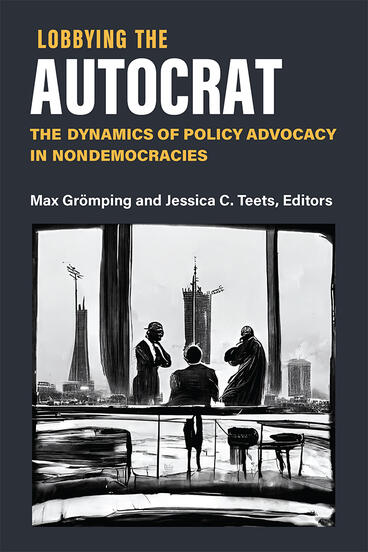Lobbying the Autocrat
The Dynamics of Policy Advocacy in Nondemocracies
The surprising symbiosis between dictators and citizen lobbyists complicates our understanding of autocratic regimes
Description
Although authoritarian countries often repress independent citizen activity, lobbying by civil society organizations is actually a widespread phenomenon. Using case studies such as China, Russia, Belarus, Cambodia, Malaysia, Montenegro, Turkey, and Zimbabwe, Lobbying the Autocrat shows that citizen advocacy organizations carve out niches in the authoritarian policy process, even influencing policy outcomes. The cases cover a range of autocratic regime types (one-party, multi-party, personalist) on different continents, and encompass different systems of government to explore citizen advocacy ranging from issues such as social welfare, women’s rights, election reform, environmental protection, and land rights. They show how civil society has developed adaptive capacities to the changing levels of political repression and built resilience through ‘tactful contention’ strategies. Thus, within the bounds set by the authoritarian regimes, adaptive lobbying may still bring about localized responsiveness and representation.
However, the challenging conditions of authoritarian advocacy systems identified throughout this volume present challenges for both advocates and autocrats alike. The former are pushed by an environment of constant threat and uncertainty into a precarious dance with the dictator: just the right amount of acquiescence and assertiveness, private persuasion and public pressure, and the flexibility to change quickly to suit different situations. An adaptive lobbyist survives and may even thrive in such conditions, while others often face dire consequences. For the autocrat on the other hand, the more they stifle the associational sphere in an effort to prevent mass mobilization, the less they will reap the informational benefits associated with it. This volume synthesizes the findings of the comparative cases to build a framework for understanding how civil society effectively lobbies inside authoritarian countries.
Max Grömping is Senior Lecturer in the School of Government and International Relations at Griffith University.
Jessica C. Teets is Professor in the Political Science Department at Middlebury College.
Reviews
“Lobbying the Autocrat sets the agenda for an expanded literature on lobbying outside the boundaries of democracy. It will be seen as the first one to raise systematic issues of how advocacy works under authoritarianism and to present an ambitious agenda for future research so that our understanding of lobbying and advocacy can become truly global. It is equally important for the empirical findings presented, the theoretical framework presented, and the future research agenda that it proposes.”
- Frank R. Baumgartner
—Frank R. Baumgartner, University of North Carolina at Chapel Hill
“Anchored in a clearly defined theoretical framework, this impressive volume sheds light on how lobbying works in authoritarian regimes, drawing from rigorous empirical research in a wide range of authoritarian contexts. It shows how advocacy groups in such environments carefully adapt to the pervasive uncertainty and threat of repression they confront to lobby authoritarians and shape policy.”
- Erica Frantz
—Erica Frantz, Michigan State University
“This is an impressive volume. By showing that civil societies can lobby for their interests even under authoritarian rule, it underscores the hopeful power of activism in all settings—not just in democracies. What a refreshing, creative spark to our knowledge of political regimes and public policy!”
- Sean Yom
—Sean Yom, Temple University
“The book fills a gap in the academic literature of authoritarian regimes which has already studied the role of elections, legislatures and other institutions of democratic rule.”
—Stephan Ortmann, Chinese University of Hong Kong
- Stephan Ortmann

